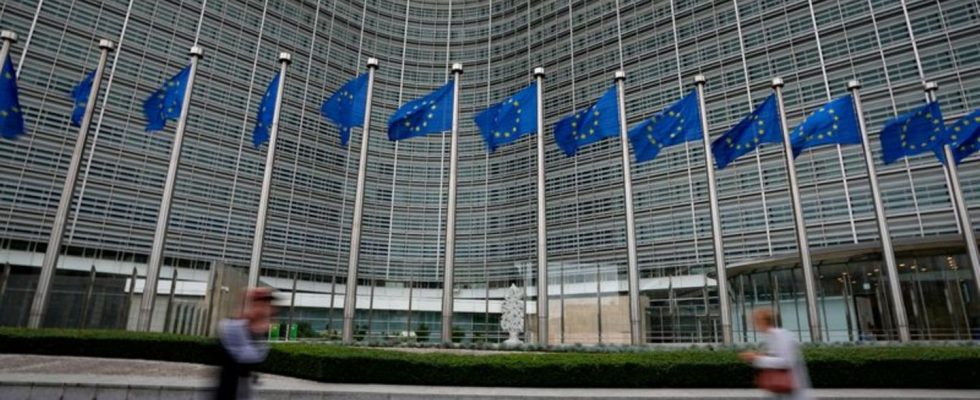At the EU summit, all eyes are on the Hungarian head of government. Viktor Orban could prevent a decision on EU accession negotiations with Ukraine from being made. Kyiv warns.
Is there a lot of excitement and then a happy ending? Or will there be a big crash and debacle this time? Shortly before the last regular EU summit this year, it is completely unclear how the heads of state and government will diverge after their discussions.
The two-day meeting in Brussels will discuss the European Commission’s proposal to open EU accession negotiations with Ukraine and Moldova. Discussions about a possible increase in the long-term EU budget are also planned.
According to the wishes of the EU Commission, this should be supplemented, among other things, by a new financing instrument for Ukraine. 50 billion euros could be made available to the country attacked by Russia over the next few years.
It is unclear whether there can be far-reaching decisions at the summit. The main reason is the blockade threats from Hungarian Prime Minister Viktor Orban. He had made it clear several times in the past few weeks that, in his view, no decisions should be made on the budget or EU accession negotiations with Ukraine at the moment – for example because the country attacked by Russia has not yet met all of the reform requirements. Since decisions on both issues must be made by consensus, Orban could theoretically block them with a veto.
Start of EU summit delayed
As a spokeswoman for EU Council President Charles Michel announced, there should be small-scale talks with Orban before the top meeting. According to the spokeswoman, Chancellor Olaf Scholz, French President Emmanuel Macron and Commission President Ursula von der Leyen will also take part.
Immediately before the EU summit, Hungarian Prime Minister Viktor Orban reiterated his opposition to a decision to start EU accession negotiations with Ukraine. Seven preconditions had been set and even according to the EU Commission’s analysis, three of them had not recently been met, Orban said upon his arrival in Brussels. That’s why there is nothing to discuss at the moment. You have to come back to it when the conditions are met.
At the same time, the Hungarian Prime Minister made it clear that he was also against using the EU budget to create a new instrument for financial support for Ukraine, which was attacked by Russia. This should be done outside the budget, said Orban, arguing that from his point of view there is no time pressure. The interim solution is already in the budget, said Orban.
Veto as a means of pressure?
EU diplomats believe it is possible that Orban’s comments only want to increase the pressure to release further frozen EU funds for his country. However, others point out that the right-wing populist has recently claimed several times that he does not want to give in on the Ukraine issue even after funds have been released.
In a letter to EU Council President Charles Michel, Orban recently wrote that he urgently asked not to plan any decisions at the summit because this would lead to failure given the lack of consensus. Such a counterproductive scenario must be avoided in the interests of EU unity.
The EU Commission announced on Wednesday shortly before the summit that it would release ten billion euros in frozen EU funds for Hungary because judicial reforms had fulfilled reform requirements. However, other budget funds amounting to almost twelve billion euros as well as Corona aid worth billions remain blocked.
Federal government: Fresh money only for Ukraine
Chancellor Olaf Scholz (SPD) is expected to attend the summit for Germany. He is calling for a decision to start accession negotiations with Ukraine. “It is important to us that we now set the course that will advance the accession process here in Europe and that this is also a decision that is supported by all member states,” said the SPD politician in Brussels. Germany strongly supports the EU Commission’s proposals.
However, the Federal Government has rejected the EU Commission’s proposal to make billions in additional payments to the EU budget by the end of 2027, for example in order to be able to promote the competitiveness of industry even better. From Germany’s perspective, only additional funds should be planned for supporting Ukraine and other expenditure not yet planned should be financed through reallocations.
Ukraine warns against the EU saying no
The government in Kiev recently warned of “devastating consequences” if the EU summit to start EU accession negotiations with Ukraine failed due to a veto by Hungary. If there is no positive decision, it would be extremely demotivating for the people of Ukraine, Foreign Minister Dmytro Kuleba said earlier this week. In addition, the impression would then be given to the outside world that the EU is not in a position to make decisions of a historical nature.
With a view to the desired start of accession negotiations with the EU, Kuleba argued that his country had fulfilled a large part of the most recently outstanding obligations. In addition to anti-corruption laws, this also included the rules demanded by Hungary on the education and use of the languages of national minorities.
Orban refers to the summit decision
However, Orban sees the open Ukrainian admission that it has not yet fully met all the requirements as a point in itself. He argues that the EU Commission’s proposal to start accession negotiations is not compatible with a summit decision from June 2022. This states that a decision on further steps in the accession process should only be made when “all of these conditions have been fully met”.
Supporters of a positive decision, on the other hand, point out that the start of EU accession negotiations would be primarily a symbolic step, as the talks are likely to last for many years and Ukraine’s accession before the end of the Russian war of aggression is considered impossible.

